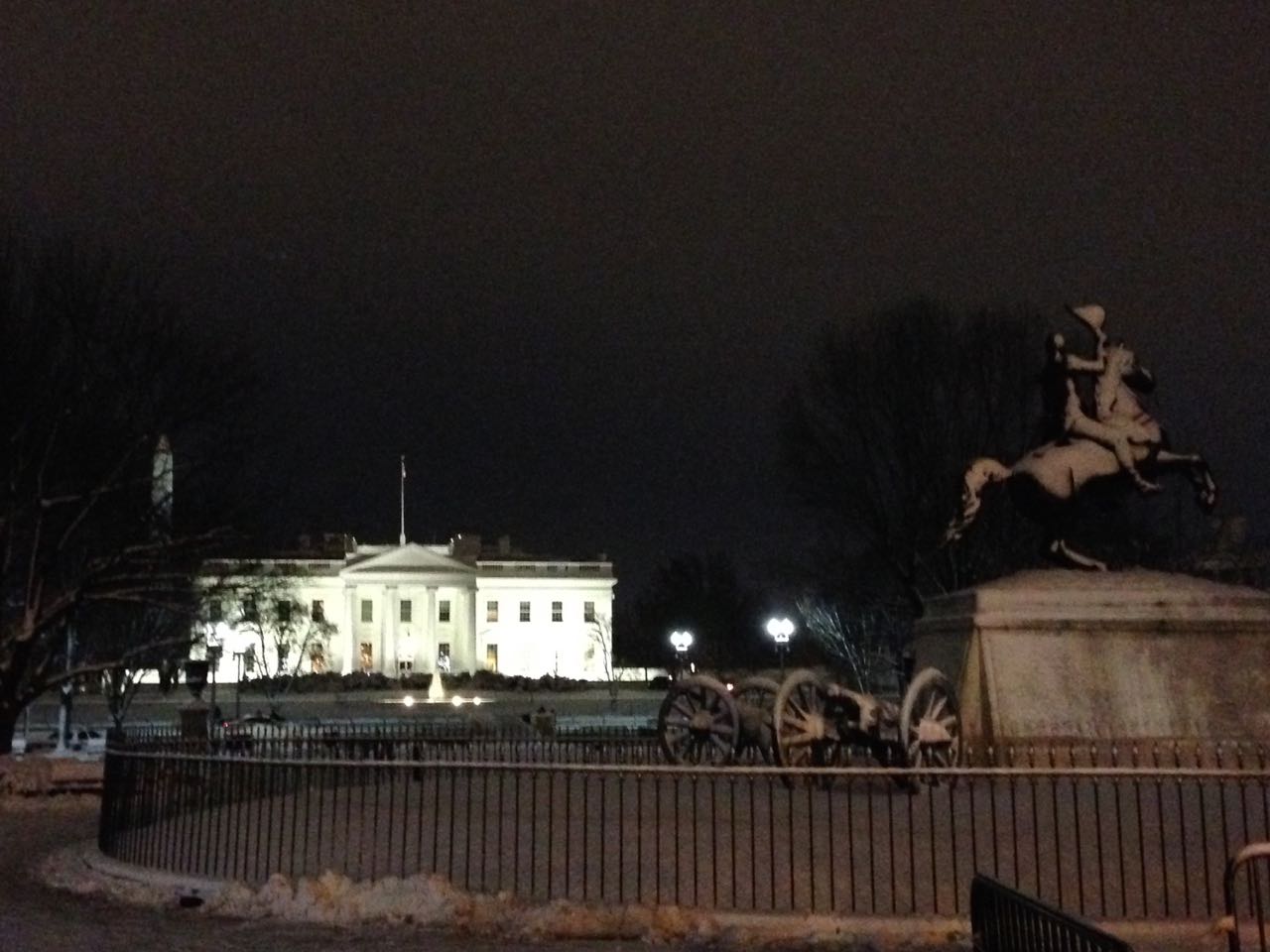By Rachna Choudhry, 3/8/15

From our Hill Sources: There are, first, some big developments to report from last week: Congress did pass a “clean” DHS funding bill, and the Senate was not able to override a Presidential veto of the Keystone XL Pipeline bill. And we all faced a snow day last Thursday, which shut down much of the city! (Thanks to our "Hill Sources" for the great photos!) This week, the House is in recess, but the Senate will be in session to address human trafficking, assistance to Ukraine and the President's request to use military force against ISIS. Here’s a look at the week ahead.


Keystone XL Pipeline
On February 24, the President vetoed legislation passed by Congress that would have approved the construction of the Keystone XL pipeline. This veto was just the third of his Presidency.
TO THE SENATE OF THE UNITED STATES:
I am returning herewith without my approval S. 1, the "Keystone XL Pipeline Approval Act." Through this bill, the United States Congress attempts to circumvent longstanding and proven processes for determining whether or not building and operating a cross-border pipeline serves the national interest.
The Presidential power to veto legislation is one I take seriously. But I also take seriously my responsibility to the American people. And because this act of Congress conflicts with established executive branch procedures and cuts short thorough consideration of issues that could bear on our national interest — including our security, safety, and environment — it has earned my veto.
Last week, the Senate unsuccessfully attempted to override the President’s veto of the Keystone XL Pipeline Approval Act (S 1). The Senate needed 67 votes (more than two-thirds support) to override the veto. The vote was 62 to 37.
What’s Next?
Supporters of the Keystone pipeline are vowing to keep trying to pass a Keystone approval bill. As Senator Heidi Heitkamp (D-ND), who recruited ten Democratic Senators to support the Keystone approval bill, explained: “We need to roll up our sleeves and offer up creative, proactive solutions that bring all sides to the table – because if one thing is clear about this latest disappointment on Keystone, it’s that the same tactics on the same bill aren’t going to deliver the four Democratic votes that this project’s survival hinges on. I’ll continue to work with my colleagues on both sides of the aisle to garner that support, but we’ve got to do it together. Together, we can approve the Keystone pipeline and embark on legislation that drives us closer to a true all-of-the-above energy plan.” (Learn more about Keystone in POPVOX’s Issue Spotlight)
Voting Rights on the 50th Anniversary of "Bloody Sunday"
Saturday marked the 50th anniversary of “Bloody Sunday,” a clash between marchers and police in Selma, Alabama that left more than 50 people injured. As part of events honoring the march, and the civil rights movement, lawmakers are calling for strengthening the Voting Rights Act.
Last month, the House and Senate passed a bipartisan bill, HR 431, awarding the Congressional Gold Medal to the Foot Soldiers who participated in Bloody Sunday, Turnaround Tuesday, or the final Selma to Montgomery Voting Rights March in March of 1965, which served as a catalyst for the Voting Rights Act of 1965.
Related Bills
The Voting Rights Act has been reauthorized four times since 1965, most recently in 2006 President George W. Bush. However, the Supreme Court in 2013 stuck down a Voting Rights Act formula that determined which state and local governments had to get approval before changing their voting laws. Here's a look at bills related to the Voting Rights Act after the Supreme Court decision.
-
Voting Rights Amendment Act (HR 885)
—Bipartisan— “Response to the Supreme Court’s Shelby County decision which struck down a core provision in the Voting Rights Act. That provision determines how states are covered under Section 5 of the law, which requires Federal preclearance to protect against discriminatory voting measures. The bill updates the coverage formula by making all states and jurisdictions eligible for coverage formula based on voting violations in the last 15 years. States and jurisdictions that have had a clean record over the last 15 years would not be subject to coverage,” according to the bill sponsors. (Bill text)
-
Civil Rights Voting Restoration Act (S 457)
—Bipartisan— "A criminal record is currently one of the biggest impediments to voting in federal elections. The Civil Rights Voting Restoration Act will reform existing federal law and give low-level ex-offenders another opportunity to vote. This is an issue that I feel strongly about, and I will continue to fight for the restoration of voting rights in the hopes of giving non-violent ex-offenders a second chance," according to the bill sponsor, Senator Rand Paul (R-KY). (Bill text)
-
Right to Vote Constitutional Amendment (HJRes 25)
“Would amend the US Constitution to provide all Americans with the affirmative right to vote and protect this fundamental right,” according to the sponsors. “While most Americans believe an explicit right to vote is enshrined in our Constitution, the Constitution in fact contains no expressed guarantee of an individual’s right to vote, a point that was confirmed by the Supreme Court’s decision in Bush v. Gore. Only a constitutional amendment can ensure this right will be guaranteed in the future. Proposing an amendment to the Constitution of the United States regarding the right to vote.” (Bill text)
-
State Sovereignty in Voting Act (HR 951)
“Would ensure that the several states ultimately decide for themselves whether to require documents above and beyond the federal standard to determine citizenship for voting registration,” according to the bill sponsor. “The State Sovereignty in Voting Act makes very, very clear that the states are free to enact their own additional safeguards to protect the integrity of the franchise from those seeking to fraudulently influence America’s elections.” (Bill text)
Assistance to Ukraine
House Speaker John Boehner (R-OH) and a bipartisan group have asked President Obama to provide weapons to Ukraine’s military: “We urge you to quickly approve additional efforts to support Ukraine’s efforts to defend its sovereign territory, including through the transfer of lethal, defensive weapons systems to the Ukrainian military,” they explained in a letter to the President. The House and Senate passed the Ukraine Freedom Support Act last year, giving President Obama the authority to provide defensive and “lethal” military support to Ukraine.
Last week, the House held a hearing, Ukraine Under Siege, and this week, the Senate Foreign Relations Committee will hold a hearing “to examine United States policy in Ukraine, focusing on countering Russia and driving reform.”
Background
In February 2014, after pro-European Union protests in Ukraine, then-President Viktor Yanukovych’s government collapsed and the Ukrainian parliament approved a new pro-Western government. In the following months, Russia annexed Ukraine’s Crimea region and armed pro-Russian separatists seized parts of eastern Ukraine. According to US and NATO officials, Russia stepped up its support to the separatists in early September, deploying several thousand Russian troops to fight in Ukraine.
This conflict has also exacerbated Ukraine’s other long-standing problems, including government corruption and financial destabilization. The European Union offered an 11.1 billion Euro (about $15.5 billion) aid package to Ukraine, and imposed sanctions on individuals responsible for “undermining Ukraine’s sovereignty and territorial integrity, as well as key state-owned firms in Russia.” (Source: Congressional Research Service report) President Obama also issued several Executive Orders in 2014, placing sanctions on more senior officials of the Russian government and individuals in Crimea, as well as prohibiting Crimean imports and exports.
Since the crisis began, the United States has provided almost $355 million in foreign assistance, in addition to up to $2 billion in loan guarantees. According to Assistant Secretary of State Victoria Nuland, who testified last week before the House Foreign Affairs Committee, these funds to Ukraine are being used “to strengthen energy security; insulate Ukraine’s poorest citizens from the impact of rising gas costs; help fight corruption; strengthen the Ukrainian border guard and military—$118 million in security support alone—and to support political reforms, elections and cleaner government.” The President’s FY16 budget requests $513.5 million in aid to Ukraine.
Related Bills in Congress
Congress has introduced these proposals addressing the crisis in Ukraine.
-
Resolution (HRes 122)
—Bipartisan— “Calls on Congress and the White House to work in the best interest of our friend and ally, Ukraine, and support a safe and sovereign nation through common sense measures: Supporting serious reform efforts, calling on President Obama to follow through with the provision of financial and defensive military aid, and encouraging the continuation of anti-corruption efforts in Kiev,” according to the sponsors. (Resolution text)
-
Ukraine Assistance (HR 955)
—Bipartisan— Authorizes the Secretary of Defense, in coordination with the Secretary of State, to provide assistance (including training, equipment, lethal weapons of a defensive nature, logistics support, supplies, and services) to the military and national security forces of Ukraine through September 30, 2017, to help Ukraine: (1) secure its sovereign territory against foreign aggressors, (2) protect the Ukrainian people from attacks posed by Russian-backed separatists, and (3) promote the conditions for a negotiated settlement to end the conflict. (Bill text)
-
Crimea Annexation Non-recognition Act (HR 93)
Prohibits federal agencies from taking action that recognizes Russian sovereignty over Crimea, according to the bill sponsors. (Bill text)
-
Defense of Ukraine Act (S 452)
“Would authorize the President to arm Ukraine with lethal military aid,” according to the bill sponsor. “Currently the only bill in Congress that specifically authorizes the United States to provide Ukraine with lethal weapons, which would remove any ambiguity as to whether the US should supply its ally with offensive or defensive military aid. This is the only bill to also require the President to deliver to Congress a comprehensive strategy for our nation’s support of Ukraine.” (Bill text)
Also in the Senate…
The Senate had originally planned to consider a bill which would require that Congress approve any nuclear agreement with Iran. Obama Administration officials indicated that the President may veto the bill, if it passed. Senate Majority Leader Mitch McConnell (R-KY) said that he will delay a vote on the bill:
-
Iran Nuclear Agreement Review Act (S 625)
Requiring congressional review of any comprehensive nuclear agreement with Iran, according to the bill sponsors. This bill is identical to S 615, introduced a week prior. It “would mandate the President submit the text of any agreement to Congress and prohibit the Administration from suspending Congressional sanctions for 60 days. During that period, Congress would have the opportunity to hold hearings and approve, disapprove or take no action on the agreement.” (Bill text)
From our Hill Sources: Senate Majority Leader Mitch McConnell (R-KY) intends to “vitiate cloture” on the motion to proceed with the bill, delayed a vote, after some Senate supporters of S 615 opposed to the fast-tracking of this issue. In a letter to Senator McConnell, they wrote: “As supporters of S. 615, the Iran Nuclear Agreement Review Act of 2015, we object to you bypassing the committee process by bringing this bipartisan legislation—under a new bill number—directly to the floor for debate and a vote outside of the regular order of the Senate.”
The Senate is also expected to vote on human trafficking legislation this week:
-
Justice for Victims of Trafficking Act (S 178)
—Bipartisan— “Would empower law enforcement to further crack down on human traffickers in communities across the country while bringing about greater restitution and justice for victims. In addition to law enforcement provisions, the Justice for Victims of Trafficking Act helps victims rebuild their lives by using fines and penalties against perpetrators to improve the availability of restitution and witness assistance funds,” according to bill sponsors. (Bill text)
On Wednesday, the Senate Foreign Relations Committee will hold a hearing to consider the President's request for authorization to use force against ISIS:
-
The President’s Draft Authorization for the Use of Military Force (AUMF)
Would not authorize long‑term, large-scale ground combat operations like those our Nation conducted in Iraq and Afghanistan. Would provide the flexibility to conduct ground combat operations in other, more limited circumstances, such as rescue operations involving US or coalition personnel or the use of special operations forces to take military action against ISIL leadership. Would also authorize the use of US forces in situations where ground combat operations are not expected or intended, such as intelligence collection and sharing, missions to enable kinetic strikes, or the provision of operational planning and other forms of advice and assistance to partner forces. (Source: Letter from the President to Congress) As the President explained:
“I have directed a comprehensive and sustained strategy to degrade and defeat ISIL. As part of this strategy, US military forces are conducting a systematic campaign of airstrikes against ISIL in Iraq and Syria. Although existing statutes provide me with the authority I need to take these actions, I have repeatedly expressed my commitment to working with the Congress to pass a bipartisan authorization for the use of military force (AUMF) against ISIL.” – President Obama
— Please keep in mind that highlighting a bill doesn't imply a POPVOX endorsement in any way. Rather, we're simply trying to offer one more way to stay informed of a complex legislative system. —